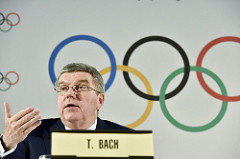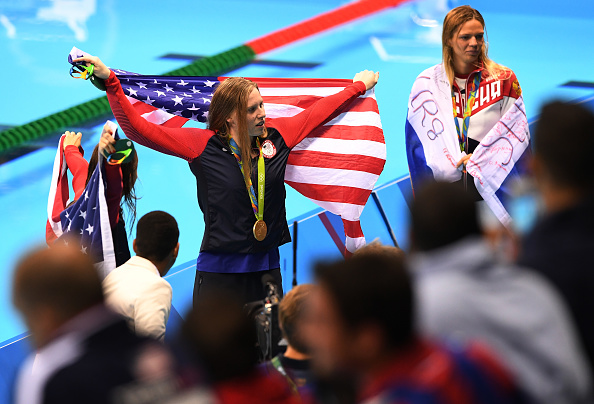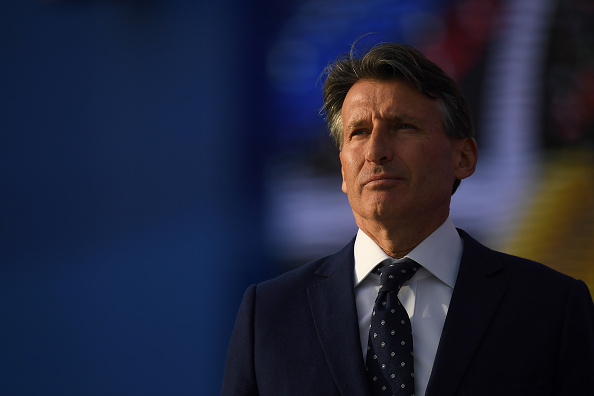The law of unintended consequences can be a horrible thing. Simply put, we don’t know what we don’t know.
If the Russians are kept out of the 2016 Olympics, what will be the import for sport? In politics? In global affairs? Don’t kid yourself. The Russian president, Vladimir Putin, can be deadly serious about a lot of things.
To be clear, this is a watershed moment in Olympic history. That’s why the International Olympic Committee needs to be on the right side of that history, and see that the Russians get to the 2016 Games in Rio de Janeiro.

There surely will be critics, loud and long.
But the right to be judged as an individual is central to everything the Olympic movement stands for.
At least in theory.
No question: Russia is a key player in the Olympic scene. Putin is arguably one of the three leading figures in international sport, along with International Olympic Committee president Thomas Bach and, maybe, whoever is in charge of FIFA this week.
The Russians — unlike, for instance, the United States — have not only staged but helped to underwrite any number of significant recent events: the 2013 world track and field championships and Summer University Games, 2014 Winter Games and 2015 world swim championships. Not to mention any number of World Cups in any number of sports, winter and summer.
And, of course, they are due to stage the 2018 soccer World Cup.
Ordinarily, doping matters do not occasion news releases from the head of state, no matter where. Here, though, was Putin earlier this week, in a Kremlin statement, referring to the boycotts of the 1980 and 1984 Games:
“In short, people had their dreams broken and became hostages of political confrontation. The Olympic movement found itself in a serious crisis and faced divisions within. Later, some of the political figures of that era on both sides admitted that this had been a mistake.
“Today, we see a dangerous return to this policy of letting politics interfere with sport. Yes, this intervention takes different forms today, but the essence remains the same; to make sport an instrument for geopolitical pressure and use it to form a negative image of countries and peoples. The Olympic movement, which is a tremendous force for uniting humanity, once again could find itself on the brink of division.”
What happens if doping allegations keep the Russians out of Rio? No one knows.
Not much taken with the Russians? Just wait until the only places left to bid for major events are the Gulf States and, oh, Azerbaijan.
One thing we do know: the Russian matter has exposed the complete and utter hypocrisy from those who would ban athletes from an entire state without proven, reasoned, calm justification.
We know this, too, about Thursday’s decision by the Swiss-based Court of Arbitration for Sport: it is not, repeat not, the case that the Russians, even those on the track and field team, are absolutely out of Rio. The door is for sure open, as a close reading of the CAS matter makes plain.
This, too: the door is still open for Russians in other sports to take part in the Games, which begin Aug. 5, just two weeks away. Indeed, swimming’s international governing body, FINA, on Thursday put out a release saying it was “pleased” to “reveal” the “final entry list” for synchronized swimming at the 2016 Olympics. There on the list of eight teams, between Japan and Ukraine: Russia.
What we do not know is what the IOC, its policy-making executive board due to meet Sunday, is going to do in the aftermath of the CAS ruling, and amid extraordinary scrutiny.
At issue are arguments on both sides.
But the more compelling argument is in favor of the Russians.
That may be a super-unpopular position —especially in the west, and in particular the United States, Canada and Great Britain, where the mainstream media has largely been riding a nouveau Cold War-style rush to judgment.
But it’s true.
And for that core reason:
The Olympics are about fair play.
Everyone — repeat, everyone — deserves to be judged individually. That is the essence of fairness.
On Thursday, for instance, the U.S. Anti-Doping Agency announced that Nataliya Lehonkova, 33, a track and field athlete from Ukraine, had tested positive in February for meldonium after taking it last August and November — but would not face sanction based on guidelines issued June 30 by the World Anti-Doping Agency.
She got judged individually.
Last week, USADA announced it was not going to levy sanction in the matter of an 18-year-old American gymnast, Kristen Shaldybin, of Highwood, Illinois, who tested positive June 7 for a prohibited diuretic. Why? Because it was in tap water that ran through the municipal water supply.
She got judged individually.
Remember, as Sting said, if in a very different context, the Russians love their children, too. The Russians are human beings. Just like you and me. That essential dignity deserves not just to be recognized but honored. That is the Olympic ideal.
For those who believe that what’s at stake is the honor and integrity of the Olympic movement, check.
The arguments in favor of a wholesale Russian ban go like this:
One, banning the Russians means being on the side of "clean" athletes.
No, it doesn't. The authorities can't prove that anyone is "clean" any more than they can prove that the 68 Russians are collectively dirty. Marion Jones passed hundreds of doping tests. So did Lance Armstrong. Moreover, there's a strong element of intent associated now with the anti-doping rules, and notions such as "choice" can be subject to varying interpretation in different parts of our world. Maybe even in Russia.
Two, the McLaren Report offers evidence of state-sponsored doping. If ever a state deserved to be sanctioned, it’s now and that state is Russia. Yes, there will be collateral damage — in particular the 68 athletes on the track and field team. Sorry, you 68, about that.
That’s not the way any reasonable, rational or logical system of law, ethics, morality or policy works.
At least one of which we can be proud.
And for many, many reasons.
To begin:
In what context, primarily, does the phrase “collateral damage” assume its most significant meaning? War, of course. The Olympics are about promoting peace.
In the 100 year-plus history of the modern Olympic movement, a state has been kept away (or the Games canceled) for only three reasons: war, apartheid and the subjugation of women. Who wants to make the case that doping — no matter how serious — rises to the station of war, or apartheid, or the diminishment of an entire class of human beings?
The evidence in the case against Russia is based on allegation. Again, the entire case against Russia right now is based on allegation only. Are those allegations extraordinarily suggestive? Yes. Are they more likely than not true? Could well be. But have they been tested in a formal setting, under oath, subject to cross-examination? Not at all. Without that — without due process and, especially, the crucible of cross-examination — it’s unfair in the extreme to proceed with broad sanction.
-- The pole vault champion Yelena Isinbayeva Thursday, after the CAS decision, decrying "pseudo-gold medals." The last sentence, before the emoji string, says, "Power is always feared." --
The Russians can and should be held to the most rigorous standard. But so should everyone.
If you think Russia is the only nation in the world where you could allege state-sponsored doping — call me immediately, because I have a beautiful bridge in Brooklyn I would be delighted to sell.
The United States is the only country in the world where Olympic sport is not an arm of a federal ministry. Just three years ago, Turkey suspended 40 track and field athletes for doping, 20 of whom were under age 23. Because there has been no formal inquiry like the McLaren Report into Turkey, Turkey is in the clear but Russia is under the gun? What if adequately funded investigators were sent into — pick any one — Kenya, Ethiopia, China or Jamaica?
To be clear: that the United States does not operate a ministry of sport hardly excuses American athletes and their record over the years. See, again, Armstrong and Jones. And others.
To which the immediate response is: yes, but the Russians are (allegedly) state-sponsored! OK. Take off those red, white and blue American goggles. Now put on the red, white and blue Russian ones. For years, the U.S. Postal Service, an independent arm of the United States government, underwrote the Armstrong team. Now draw a meaningful distinction — go ahead, still waiting — between what is alleged in Russia and what has been proven in the United States in regard to Armstrong’s massive doping conspiracy and cover-up.
Perspective matters. A lot. Like due process and cross-examination.
The CAS ruling Thursday was decided on what lawyers would call narrow grounds, reference to a section of Rule 22 issued by track and field’s worldwide governing body, the International Association of Athletics Federations.
To be fair, international federations have to be able to approve and exert some degree of control over their member federations. No quarrel there.
But even in confirming that athletes whose national federations are suspended by the IAAF are ineligible for competitions held under IAAF rules, the CAS panel made plain the way out for the IOC — should it so choose.
Which, of course, it should.
First, the CAS panel explicitly noted that the IOC was not a party to the matter. Thus, the sport court said, it had “no jurisdiction” to decide whether the IOC could accept or decline Russian track and field athletes.
In practical terms, this amounts to blinking red lights and screaming sirens at a train crossing — it says, pay attention, because we just told you it’s OK to take the Russians even if we didn’t explicitly say so.
This is in line, and not coincidentally, with the position taken by the Association of Summer Olympic International Federations, which on Tuesday put out a statement that said, in part, “It is important to focus on the need for individual justice in all these cases and ASOIF endorses all IF decisions, including those that take into account collective responsibility of organizations under the IFs' governance.”
Next, the IAAF, recognizing that a wholesale ban could prove problematic, to say the least, sought June 17 to give the 68 Russians a path to Rio: prove a) “clearly and convincingly” that b) you were outside the country and c) subject to effective controls, then d) you could apply to compete but e) only as a “neutral” athlete.
So: not only did you have to be outside Russian jurisdiction, you also had to meet standards for being tested at a level comparable to your competition but without being told what those standards are. Who to look at? Who are your competitors? If you’re ranked 11th, who? Numbers 1, 2 and 3? Or numbers 8, 9 and 10? Someone else?
Let’s say we’re talking distance running. Now your competitors, for the sake of argument, might be Ethiopian and Kenyan. Hello?
What if you are a sprinter? The Jamaicans? The Americans? Jimmy Vicault, who is French?
What about any of that is fair?
Neutral athletes? What, Russians who “clearly and convincingly” could so prove are going to line up in Rio as a “neutral” nation, marching in the opening ceremony just in front of, say, Norway, their newly designed flag depicting a syringe with a big red X on it?
Would “Neutral” fans have to show up the stadium dressed only in gray?
Would those fans shout: “Go Neutral! Go Neutral!” Just like “U-S-A! U-S-A!” Or, “Aussie-Aussie-Aussie oi-oi-oi!”
Absurd.
So absurd that, in practice, only two of 68 Russians have been able to meet the IAAF conditions.
Accordingly, the CAS panel said it was “concerned” about the “immediate application with retroactive effect” of the IAAF’s June 17 policy, explaining: “Since such Rule invokes criteria based on long-term prior activity, it left no possibility in practice, and as applied, for the Claimant Athletes,” the Russians, “to be able to try to comply with them.”
Back to keeping-it-simple talk: “concerned” in legalese translates to “this is wrong, people.”
Essentially, it is super-unfair.
Which leads directly back to the central proposition:
The three core Olympic values are respect, excellence and friendship, all of which point toward fair play and the recognition that every single person in our broken world deserves to be accepted as an individual and, moreover, measured by his or her own conduct.
Anything less is a gross violation of the Olympic spirit, and on the wrong side of history.
And being on the wrong side, as history teaches, is very, very likely to provoke a whole host of unintended consequences.









